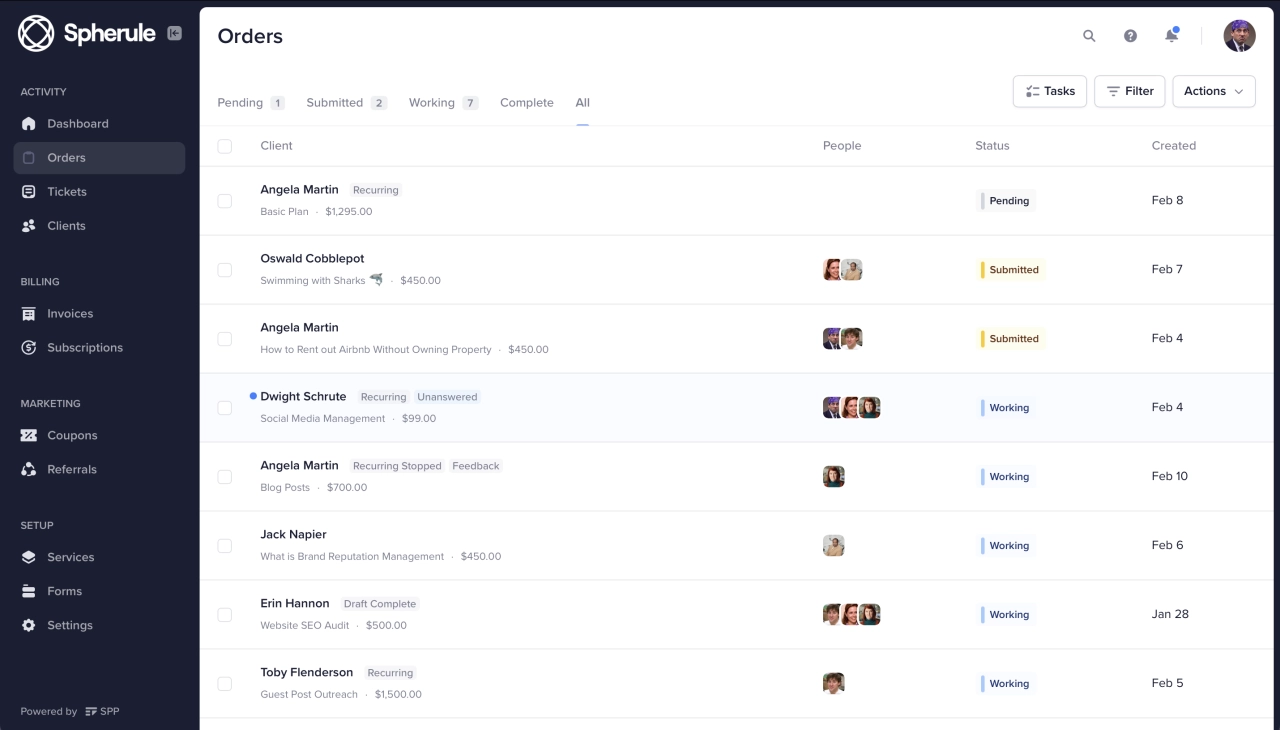- Partnering with other agencies can help you expand your service offerings, but it's important to choose the right partners.
- One way to find potential agency partners is to look up suitable agencies in online diractories such as Clutch and DAN.
- Successful agency partnerships require clear communication, shared goals and values, and a willingness to collaborate and adapt to each other's needs.
The growth of digital tools has changed how agencies operate—but starting an agency from scratch and standing out among competitors remains challenging. While many agency owners focus on building every service in-house, they often miss a more efficient approach to growth.
Strategic agency partnerships allow you to expand your service offerings without developing new capabilities from the ground up. By connecting with complementary service providers, you can deliver additional expertise to your clients while your partners gain access to your customer base. This practical approach to scaling is surprisingly underutilized by agencies looking to grow their business and increase their market value.
Agency partnerships: more than just handshakes
Strategic partnerships go far beyond casual referral arrangements. They’re structured relationships that create systematic value for both agencies and their clients. Let’s explore the tangible business benefits these partnerships deliver beyond the basics.
Lead generation on autopilot
The most immediate benefit of strategic partnerships is their ability to create a consistent lead flow without the traditional marketing costs:
partners send pre-qualified leads who already trust their recommendations
joint webinars and co-created content generate leads from multiple sources simultaneously
your expertise gets showcased to audiences who wouldn't otherwise discover you
warm introductions skip the typical trust-building phase of the sales cycle
The conversion rates on partner-referred leads are typically higher than leads you’d get by yourself.
Significant cost savings across operations
Strategic partnerships create efficiencies that directly impact your bottom line:
shared resources reduce overhead on tools, subscriptions, and specialized software
joint project management reduces administrative costs on collaborative projects
bulk purchasing power increases when partnering on client services or materials
reduced need for hiring specialists for occasional projects or capabilities
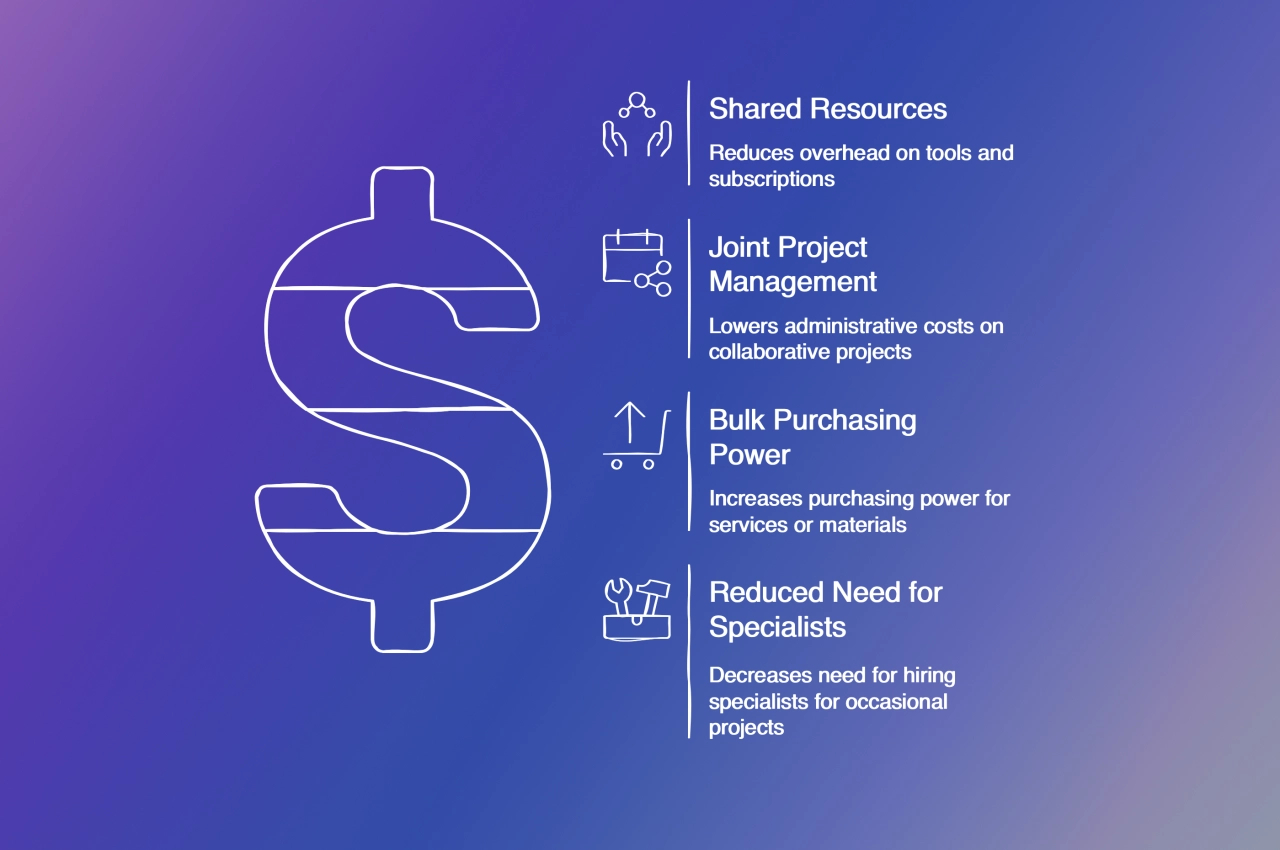
These savings aren’t just theoretical—they’re measurable. When you factor these savings alongside increased conversion rates, the profit margin improvement becomes substantial.
Technical talent without the hiring headaches
Perhaps the most valuable aspect of strategic partnerships is gaining access to specialized technical talent without the recruitment and retention challenges:
access senior-level expertise in areas like development, data analysis, or specialized design
scale technical resources up or down based on project needs without hiring commitments
leverage partner training resources to enhance your team’s technical knowledge
create technical solution packages that would be impossible to deliver independently
This flexible access to technical capability allows you to say “yes” to client requests that would otherwise be outside your scope. Instead of turning away work or scrambling to find freelancers, you have reliable partners with proven processes already integrated with your workflow.
For agencies using SPP, this technical talent sharing becomes even more seamless. You can set up partner accounts with team roles in your client portal, allowing technical collaborators to access relevant projects while maintaining ownerships over client relationships.
Benefits of agency partnerships
Forming strategic partnerships with other agencies isn’t just about expanding your service offerings—it’s about creating a growth ecosystem that benefits everyone involved. When done right, these partnerships create value that goes far beyond simple referral arrangements or project collaborations.
Improved positioning in a competitive market
The right partnerships instantly elevate how prospects and clients perceive your agency. Instead of being one of many similar providers, you become part of a specialized network with expanded capabilities:
you transition from commodity service provider to strategic solution partner
your agency gains implied endorsement from respected industry players
you create natural differentiation from agencies still trying to do everything in-house
you can justify premium pricing based on your expanded expertise network
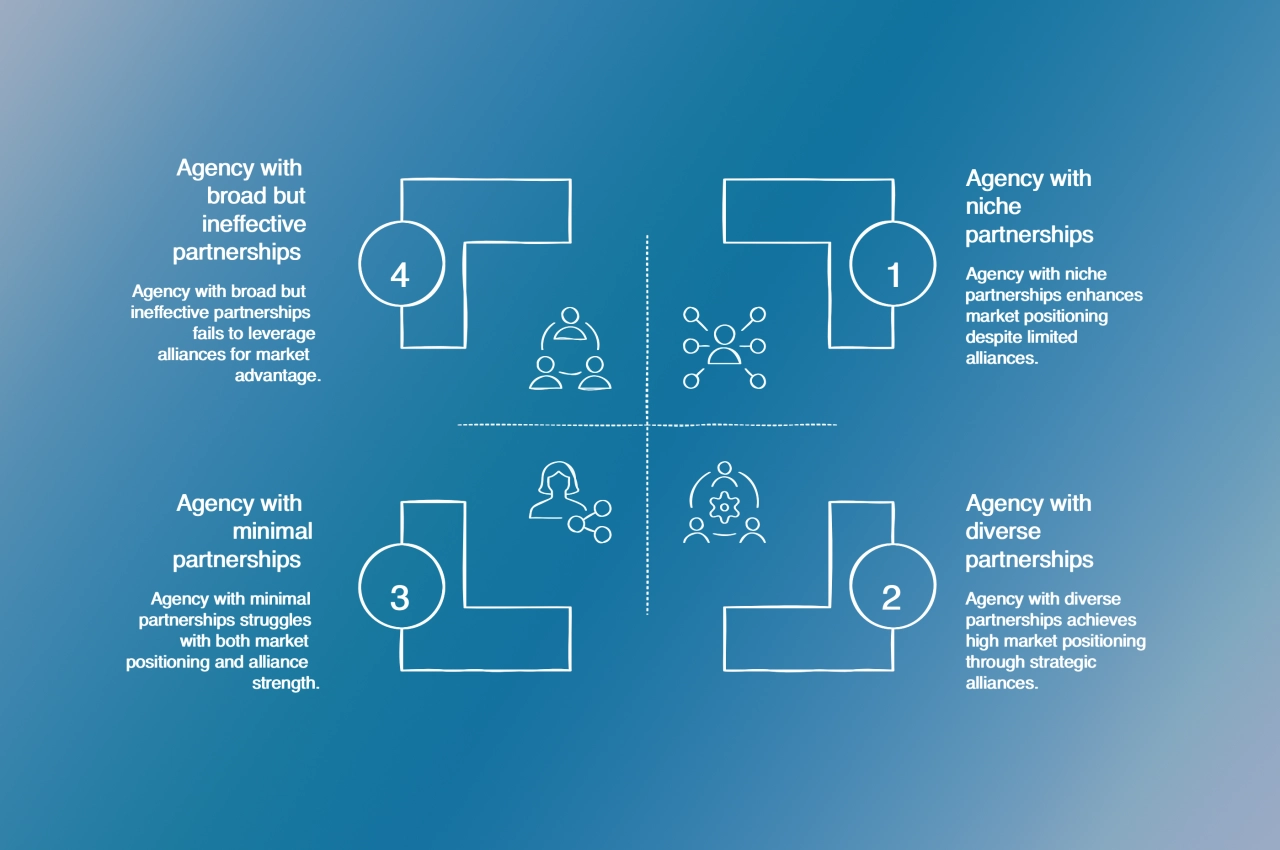
This positioning shift is especially powerful for agencies competing in crowded niches. A social media agency partnering with a video production company and a paid ads specialist creates a much more compelling market position than three separate entities each trying to win business independently.
Uncovering and addressing hidden skill gaps
One of the most valuable but least discussed benefits of agency partnerships is how they reveal the blind spots in your own service delivery.
Working closely with specialists in adjacent areas shows you:
which skills your team needs to develop to better serve clients
where your current processes create friction in the broader marketing ecosystem
which emerging trends are appearing at the edges of your specialization
how your deliverables could better integrate with complementary services
Many agency owners have a theoretical understanding of adjacent specialties, but true partnerships expose the practical reality of how these services interact. This knowledge becomes invaluable for team development, training priorities, and future hiring decisions.
Exponential audience reach without added costs
Perhaps the most immediate benefit of strategic partnerships is the expanded audience you gain access to without additional marketing spend:
each partner brings their own email list, social following, and client roster
your content and expertise reach potential clients who already trust your partner
joint webinars, events, and content pieces generate leads from multiple channels
case studies featuring combined services appeal to larger potential clients
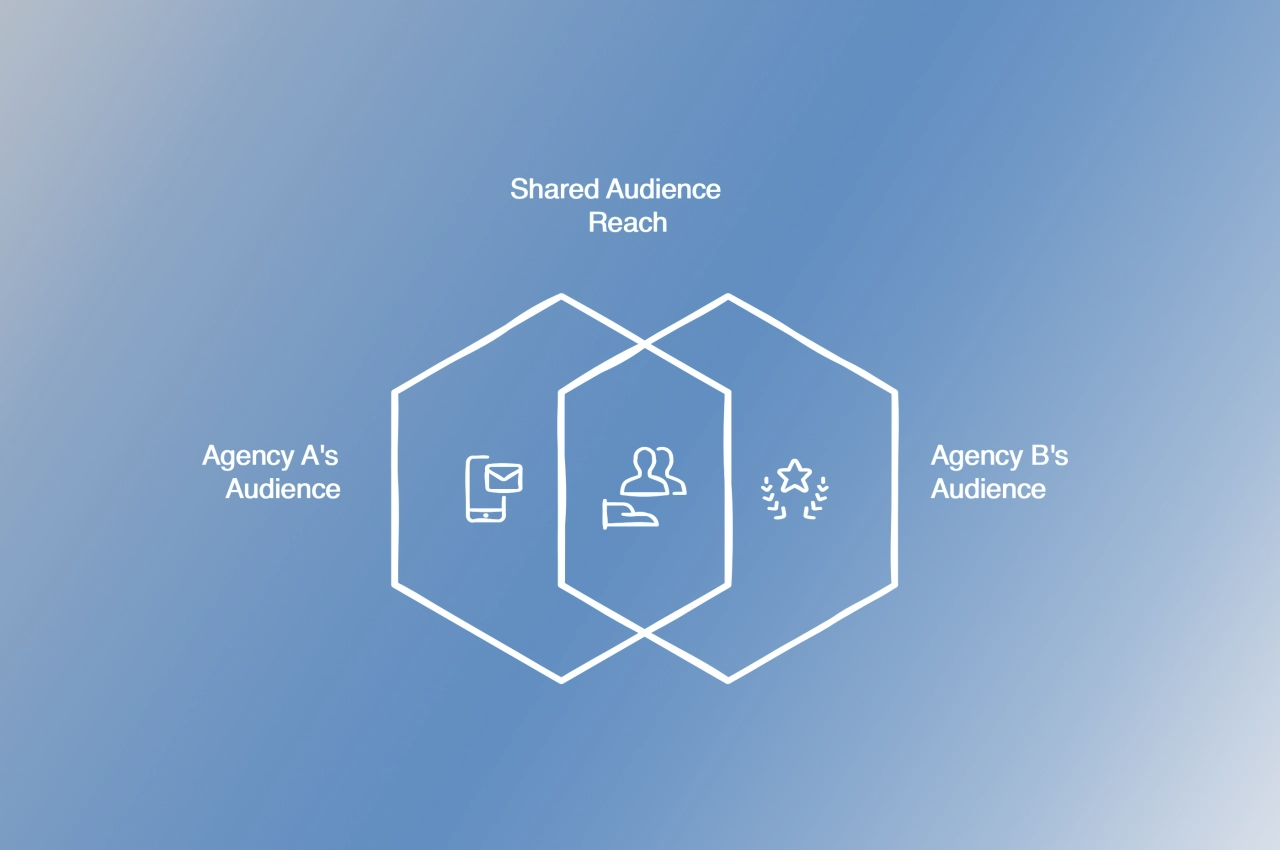
The math makes the benefit clear: three agencies each with 2,000 newsletter subscribers suddenly creates potential visibility to 6,000 qualified prospects. This expanded reach is particularly valuable for specialized agencies that typically have a limited addressable market on their own.
Reduced business volatility and more predictable growth
Beyond the marketing advantages, strategic partnerships create a more stable business foundation:
partner referrals often come pre-qualified and convert at higher rates
revenue streams diversify beyond your direct sales capabilities
resource sharing during busy periods helps manage workflow spikes
joint capabilities open doors to larger clients and projects than you could handle alone
This stability benefit becomes especially important during economic uncertainty or seasonal fluctuations. When direct business slows, partner-driven opportunities often fill the gap, creating more predictable growth patterns.
Types of strategic partnerships for agencies
As I mentioned earlier, there’s a wide range of companies out there willing to work with an agency. The partnership opportunities you pursue will depend on your agency’s needs, goals, and resources.
Here are some of the most common (and profitable):
1. Software vendor partnerships
This isn’t an agency to agency partnership; agency owners would form a mutually benefical cooperation with a tech company.
Here are a few ideas how this could work:
Reseller partnerships: You recommend the vendor’s software to your clients and receive a commission for every sale. For example, Podblade resells their services to podcast editing agencies and consultants in the same niche. The resellers need their own workspace license, bringing in valuable revenue to Service Provider Pro.
Implementation partnerships: You build a service around the implementation of a software and offer it to your clients. In return, the software vendor sends leads your way so you can start your agency onboarding process. For example, New Breed is a marketing agency that specializes in teaching businesses how to implement HubSpot’s Marketing Hub.
Collaborative partnerships: You work with the software vendor to develop joint marketing campaigns and new features for the software. The digital marketing agency NP Digital technically owns the SEO tool Ubbersuggest, but they essentially act as separate companies in a collaborative partnership.
When it comes to collaborations, there are many more ways to set up mutually beneficial agreements. For instance, the software provider could build an integration with their software that sends data to and from your client portal, such as the one we built for The HOTH.
2. Cross-border partnerships
Language and cultural differences are two barriers that digitization has yet to fully tear down—although it is getting closer. For now, cross-border partnerships are one way to overcome these barriers and tap into new markets.

In a cross-border partnership, agencies from two different countries could partner up to offer their joined services across multiple countries. This type of partnership is often used to target new markets or expand existing service offerings.
3. Complimentary service partnerships
This is the most common type of agency partnership. Two agencies with complementary skill sets team up to offer a full-service solution to their clients.
While there aren’t any rules which kinds of agencies can form partnerships, some tend to work better than others, including:
web development agencies and SEO agencies
PR agencies and social media agencies
Tip: If you’re wondering about other potentially complimentary services, have your sales and account management teams start making note of any services your clients request that you don’t currently offer. Do any patterns emerge?
Best practices for successful partnerships
Now that we’ve gone over the different types of partnerships, it’s time to talk about how to find the right partner.
Unfortunately, there’s no magic bullet for finding the one. However, there are a few steps you can take to increase your chances of finding a good match:
1. Define your goals
The first step is to define your partnership goals. What do you hope to achieve by teaming up with another company or an influencer?
Are you trying to fill a specific service gap? Are you looking to expand your geographical reach? Are you trying to tap into a new market?
Whatever your goals may be, you need to have a clear idea of what you’re looking for before you start your search. This will help you weed out partners that aren’t a good fit and focus on those that are. For instance, some agencies want to keep their partnerships purely B2B.
2. Create an ideal partner profile
As an agency owner, you’re (hopefully) familiar with ideal client profiles (ICPs). The same concept can be applied to the ideal partner profile (IPP).

Your IPP should include information about the type of agency you’re looking for, their location, their size, their core services, and any other relevant details. This will help you narrow down your search to a manageable list of agencies that fit your criteria.
3. Find potential matches
Now it’s time for the hard part: finding potential agency partners that fit your IPP.
There are a few different ways you can go about this:
Tap into your network: Ask around to see if anyone knows of any agencies that might be a good fit. If your current network is a bit thin, you can always join group such as Ramen Club.
Check out online directories: There are plenty of online directories that list agencies by location, service offering, and size—perfect for finding potential partners. Clutch, DAN, and G2 are great places to start.
Use Google: A simple Google search can turn up plenty of results, although you may need to do some digging to find the best matches.
4. Craft a compelling proposal
Now that you’ve found some perfect candidates, it’s time to craft a proposal for your partner program. A compelling proposal should include two things:
Demonstrate value: No agency enters a partnership for the fun of it. They want to see a return on their investment. When crafting your proposal, focus on how partnering with your agency will benefit them—and make sure to double down on the value proposition. If possible, include statistics or estimates about how much their business could grow as a result of partnering with you.
Demonstrate awareness: Research your potential partner’s brand. What are their core values, what is their mission, and who is their target audience? The more you know about their brand, the easier it will be to create a proposal that resonates with them. Plus, it shows them you’re serious about the partnership from the get-go.
Beyond these two points, your pitch should introduce potential partners to your agency, give them an overview of your services, and explain how you can help them reach their goals.
Draft a partnership agreement (that protects you)
Let’s be honest—most agency owners skip this critical step. While handshakes and verbal agreements might feel sufficient when relationships are fresh and exciting, they rarely hold up when challenges emerge. And trust me, challenges always emerge.
A well-structured partnership agreement isn’t just optional paperwork—it’s the foundation that allows great partnerships to weather inevitable storms. I’ve seen too many promising collaborations fall apart over misaligned expectations that could have been addressed in a simple agreement.
What belongs in your partnership agreement?
Your partnership document doesn’t need to be overly complicated, but it should address these essential elements.
1. Scope and services
Be crystal clear about what each partner is responsible for delivering:
which specific services fall under each agency’s responsibility
whether there are territorial or industry exclusivity provisions
how client acquisition and ownership works
which agency handles which aspects of client communication
This clarity prevents the all-too-common “I thought you were handling that” conversations that damage client relationships.
2. Revenue structure
Money matters can sink partnerships faster than any other factor. Address these upfront:
exact referral fee percentages or flat-fee structures
revenue sharing calculations for joint projects
payment timelines (immediately upon client payment or on specific cycles)
invoicing responsibilities and processes
how scope changes and additional client requests are handled financially
3. Quality standards and delivery expectations
Different agencies often have different internal standards. Make yours explicit:
response time requirements for client communications
deliverable quality expectations with examples if possible
review processes for work before client delivery
how performance issues will be addressed
data and asset sharing protocols
4. Term, renewal and exit strategy
All partnerships eventually change—make sure you’re prepared:
initial term length (I recommend starting with 6–12 months)
automatic renewal provisions vs. required review periods
notice periods for termination (30–90 days is standard)
client transition protocols if the partnership ends
any post-termination restrictions or ongoing obligations
Without these provisions, ending partnerships can become messy, damaging both agencies’ reputations.
5. Legal protections
Here’s where a quick consultation with a legal professional pays dividends:
confidentiality provisions for shared client information
intellectual property ownership clarifications
non-solicitation clauses (to prevent poaching each other's clients or staff)
liability limitations and indemnification
dispute resolution processes (mediation before litigation saves both time and relationships)
Sample agreement framework
While I strongly recommend having an attorney review any partnership agreement, here’s a basic framework to get you started:
AGENCY PARTNERSHIP AGREEMENT
Between [Agency A] and [Agency B]
Effective Date: [Date]
1. PARTNERSHIP SCOPE
[Detail the specific services, industries, and territories covered]
2. TERM AND RENEWAL
[Specify initial term and renewal conditions]
3. REFERRAL AND REVENUE STRUCTURE
[Detail the financial arrangements]
4. SERVICE DELIVERY STANDARDS
[Outline quality expectations and processes]
5. CLIENT MANAGEMENT
[Clarify who owns the client relationship and how communication flows]
6. CONFIDENTIALITY
[Detail confidentiality obligations]
7. TERMINATION PROVISIONS
[Specify how either party can end the agreement and what happens next]
8. DISPUTE RESOLUTION
[Establish how disagreements will be handled]
9. SIGNATURES
[Both parties sign and date]Red flags to watch for in partnership agreements
Not all partnership agreements are created equal. Watch out for these warning signs:
Vague termination clauses: Without specifics on how partnerships can end, you might find yourself trapped in an unproductive relationship.
One-sided client ownership: Ensure the agreement fairly addresses who owns the client relationship and can contact them directly.
Missing non-solicitation provisions: Without these, your partner might build relationships with your team members only to hire them away.
Unclear financial terms: Any fuzziness around how and when money changes hands will create friction eventually.
Overly restrictive exclusivity: While some exclusivity can make sense, ensure it doesn't prevent you from growing in other directions.
When to formalize partnerships
While not every collaborative relationship needs a formal agreement immediately, you should strongly consider creating one when:
the partnership involves significant revenue potential
you’re sharing sensitive client information
the relationship will be client-facing
you’re investing substantial resources in joint marketing
there’s any confusion about roles or expectations
For casual referral relationships, a simpler one-page document might suffice. For deep strategic partnerships, invest in a more comprehensive agreement—it’s significantly cheaper than dealing with partnership disputes later.
Measuring the success of your agency collaborations
Strategic partnerships aren’t just about handshakes and mutual goodwill—they should deliver measurable value to both agencies. Without clear metrics, it’s difficult to determine whether a partnership is truly beneficial or just creating additional complexity in your operations.
Revenue-based metrics
Partner-generated revenue: Track the total revenue generated from clients referred by your partners. This is the most direct indicator of a partnership’s financial impact. Set up dedicated tracking codes in your client portal to accurately attribute revenue to specific partners.
Revenue growth rate: Measure how quickly partner-generated revenue is growing compared to your overall business growth. A healthy partnership should show an increasing contribution to your total revenue over time.
Average deal size: Compare the average project value from partner referrals versus your typical clients. Strategic partnerships often lead to larger projects as you’re able to offer expanded services and attract more established clients.
LTV of referred clients: Clients who come through trusted partnerships often have higher retention rates and lifetime value. Track this metric to understand the long-term impact of your partnerships beyond initial project revenue.
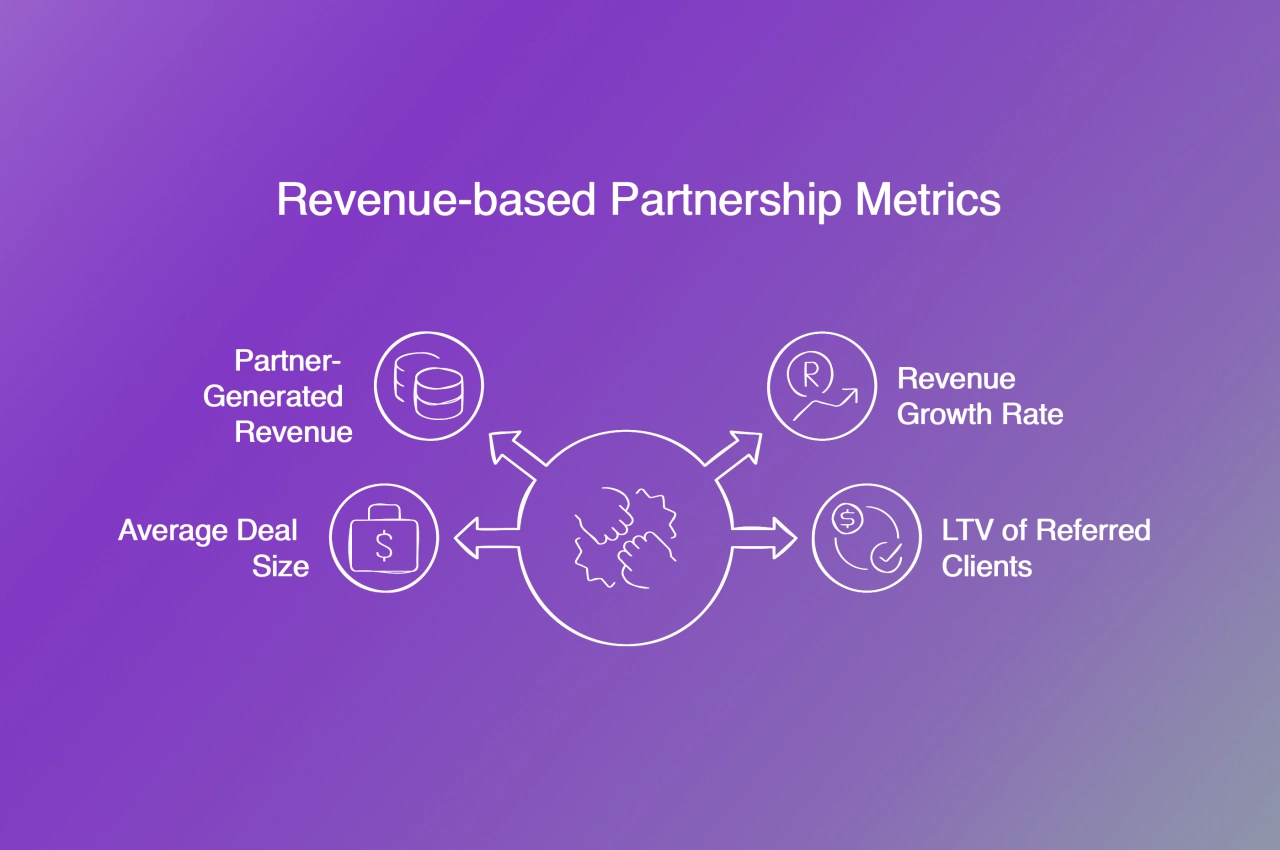
Operational efficiency metrics
Resource utilization rate: Measure how effectively your team’s skills are being utilized through partnership projects. This is particularly important for specialized agencies that may otherwise experience periods of underutilization.
Project completion time: Compare the average time to complete partnership projects versus standard projects. Effective partnerships should streamline workflows, not create additional complexity.
Cost savings: Quantify the cost savings achieved through shared resources, tools, or capabilities. This could include reduced software subscription costs, shared administrative resources, or avoided hiring expenses.
Partnership health indicators
Referral reciprocity ratio: Track the balance of leads or projects shared between you and your partner. While perfect symmetry isn’t always necessary, significant imbalances can indicate potential issues in the partnership relationship.
Response time: Measure how quickly your agency and your partner respond to each other’s needs or client requirements. Delays can indicate misaligned priorities or operational friction.
Client satisfaction scores: Compare satisfaction ratings for projects delivered collaboratively versus those delivered solely by your agency. This helps identify whether the partnership is enhancing or potentially diluting your service quality.
Implementation steps
Set up tracking in your client management system: Use SPP’s built-in referral tracking to attribute clients to specific partners and monitor their journey through your pipeline.
Establish baseline metrics before the partnership: Document your current performance across key metrics before forming the partnership to accurately measure changes.
Schedule quarterly partnership reviews: Set regular meetings with your partners to review metrics together and identify areas for improvement.
Create a shared dashboard: Build a real-time metrics dashboard that both agencies can access to maintain transparency about partnership performance, or use SPP’s referral tracking to see data in real time.
Set mutual growth targets: Collaborate with your partner to establish specific goals for your relationship, such as “increase partner-referred revenue by 25% within one year.”
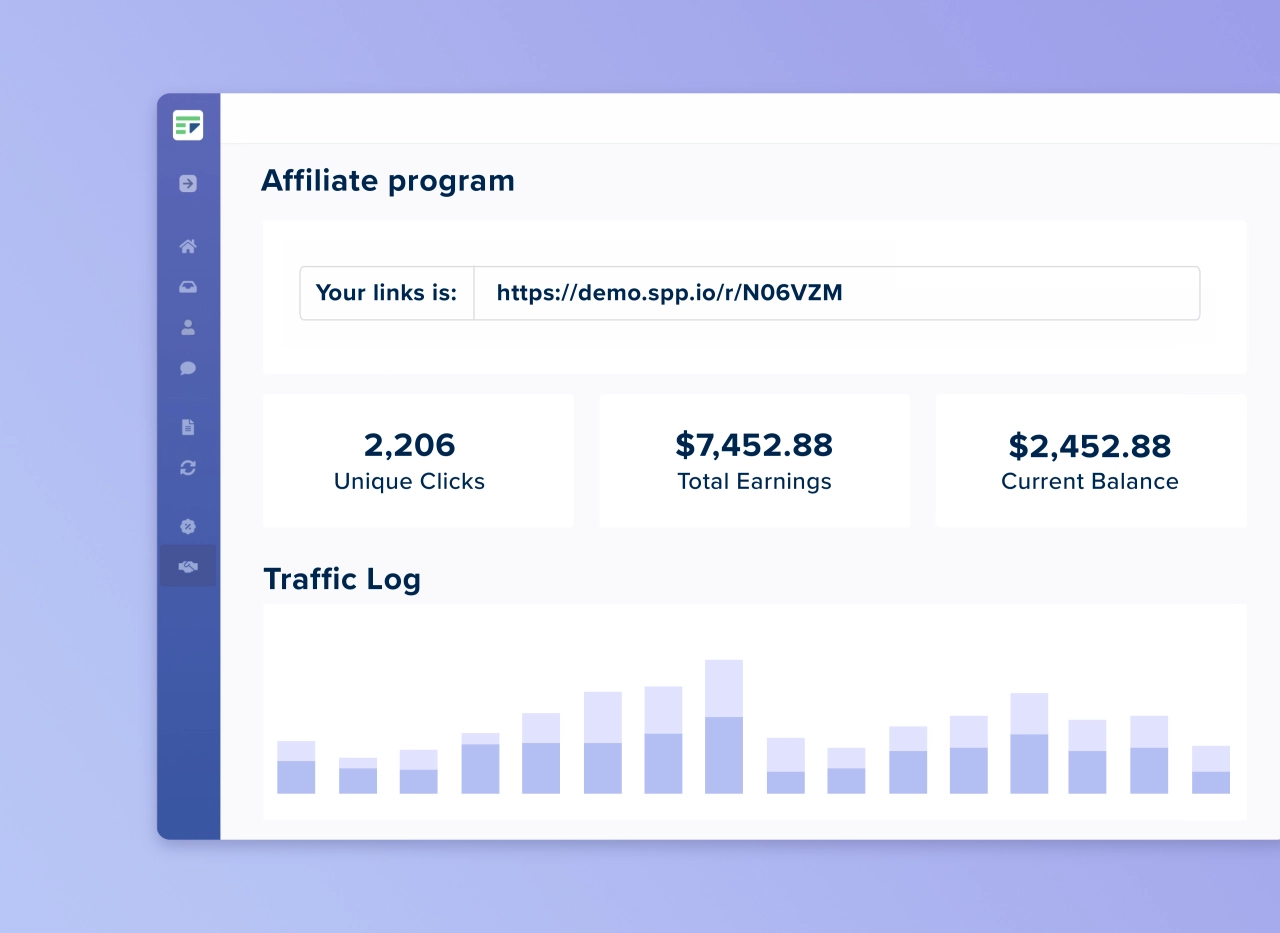
Convert your clients into brand ambassadors.
Red flags to watch for
Be vigilant about these warning signs that may indicate a partnership needs reassessment:
partner-referred clients have a significantly higher churn rate than your direct clients
the cost of managing the partnership exceeds the additional revenue it generates
consistent delays in project handoffs between agencies
declining reciprocity in lead sharing over time
negative feedback from clients about coordination between agencies
By diligently tracking these metrics, you can transform your agency partnerships from informal arrangements into strategic assets with quantifiable business impact. More importantly, you'll have the data needed to continually refine your partnership strategy and focus your efforts on the most productive relationships.
Closing thoughts
Better together—this is a great slogan that agency owners should take at heart. Instead of seeing every other agency as a competitor, think of ways you can collaborate. Strategic partnerships not only reward you with increased revenue, you can provide clients with new services while strengthening your relationship with them.
Disclaimer: The partnership strategies and financial benefits shared in this article are based on general observations and may vary significantly depending on your specific business circumstances. This content provides general guidance rather than specific financial or legal advice—I recommend consulting with relevant professionals before implementing any partnership agreements. While these approaches have worked well for many agencies, your results will depend on your unique situation, partner selection, and implementation quality.











